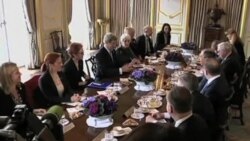STATE DEPARTMENT —
U.S. Secretary of State John Kerry and Defense Secretary Chuck Hagel are meeting with Russian Foreign Minister Sergei Lavrov and Russian Defense Minister Sergei Shoigu in a two-plus-two meeting Friday at the State Department. The meeting will come just two days after President Barack Obama canceled a summit with Russian President Vladimir Putin that was scheduled to take place next month ahead of the G20 summit in St. Petersburg.
U.S. diplomats are trying to stand on rapidly shrinking common ground with Russia going into Friday’s talks. The latest quake to rock bilateral relations came earlier this week, when President Barack Obama canceled a summit with the Russian president that was set to take place ahead of next month’s G20 conference.
State Department spokeswoman Jen Psaki explained the decision.
“We were not at the point on our progress on a number of these issues where a summit at a presidential level was the most constructive step,” said Psaki.
Issues to be discussed will likely include Moscow’s crackdown on domestic dissent, U.S. missile defense plans for Europe and - the final irritation – Russia granting asylum to Edward Snowden, who is wanted by the United States for leaking information about its secret surveillance programs.
Anthony Cordesman of the Center for Strategic and International Studies says the move is a major diplomatic setback.
"You talk. You do not send a message that is meaningful by not communicating, by not meeting," says Cordesman.
But the State Department says the man behind the latest disagreement won’t shackle progress on other issues.
"I don’t think there’s any secret about where the United States stands on Mr. Snowden. It is a part, but it is not a large part of what the agenda will be on Friday,” said spokeswoman Psaki.
Syria’s bloody civil war is also a point of contention. And it’s one that both Anthony Cordesman and the Middle East Institute’s Graeme Bannerman say will be difficult to move forward.
"Russia does not trust the United States in the Middle East. We want Russia to adopt our policy and they are not prepared to do so," said Bannerman.
Cordesman again stressed the importance of communication.
"A lot of it is going to be simply agreeing not to do things, agreeing to communicate, trying to find a way to influence from the outside."
After the 2+2 talks in the morning, Secretary Kerry and Secretary Hagel will meet separately with their counterparts in the afternoon. The goal is to keep the dialogue between the two countries flowing, even as recent disagreements threaten to dam up progress.
U.S. diplomats are trying to stand on rapidly shrinking common ground with Russia going into Friday’s talks. The latest quake to rock bilateral relations came earlier this week, when President Barack Obama canceled a summit with the Russian president that was set to take place ahead of next month’s G20 conference.
State Department spokeswoman Jen Psaki explained the decision.
“We were not at the point on our progress on a number of these issues where a summit at a presidential level was the most constructive step,” said Psaki.
Issues to be discussed will likely include Moscow’s crackdown on domestic dissent, U.S. missile defense plans for Europe and - the final irritation – Russia granting asylum to Edward Snowden, who is wanted by the United States for leaking information about its secret surveillance programs.
Anthony Cordesman of the Center for Strategic and International Studies says the move is a major diplomatic setback.
"You talk. You do not send a message that is meaningful by not communicating, by not meeting," says Cordesman.
But the State Department says the man behind the latest disagreement won’t shackle progress on other issues.
"I don’t think there’s any secret about where the United States stands on Mr. Snowden. It is a part, but it is not a large part of what the agenda will be on Friday,” said spokeswoman Psaki.
Syria’s bloody civil war is also a point of contention. And it’s one that both Anthony Cordesman and the Middle East Institute’s Graeme Bannerman say will be difficult to move forward.
"Russia does not trust the United States in the Middle East. We want Russia to adopt our policy and they are not prepared to do so," said Bannerman.
Cordesman again stressed the importance of communication.
"A lot of it is going to be simply agreeing not to do things, agreeing to communicate, trying to find a way to influence from the outside."
After the 2+2 talks in the morning, Secretary Kerry and Secretary Hagel will meet separately with their counterparts in the afternoon. The goal is to keep the dialogue between the two countries flowing, even as recent disagreements threaten to dam up progress.








